Editorial: Road To Recovery

Manufacturing will, as always, be the foundation for economic recovery and for prosecuting the war on terrorism. However, the manufacturing sector was already in one of the most serious recessions in the past three decades prior to Sept. 11. Why? In large part because manufacturing depends on state-of-the-art production equipment, and manufacturers have been hampered by archaic and counter-productive capital equipment depreciation rules for years.
U.S. Reps. Phil English, R-PA, and Richard Neal, D-MA, introduced the High Productivity Investment Act (HPI) to begin correcting this. Investment in productivity-enhancing machinery and equipment would be deducted more quickly under HPI than under present law, thereby reducing its after-tax cost and increasing its availability to businesses of all sizes. James Mack, vice president of government relations for AMT--The Association for Manufacturing Technology, says HPI is AMT's top legislative priority in the 107th Congress.
"The capital cost recovery laws in the United States are one of the most regressive taxes we have," says Richard P. Bodine Jr., chairman of Bodine Assembly and Test Systems. "They have severely hampered our ability to compete with our European and Japanese friends for more than 20 years, and we need significant modification of those rules." Although corporate tax rate cuts are being discussed, Bodine believes that the best approach is to "accelerate" the current capital equipment depreciation rules into oblivion, and simply allow manufacturers to expense capital equipment immediately.
Douglas L. Swanson shares this belief. "To achieve an immediate national economic upturn, totally eliminate all tax-related depreciation schedules for production and manufacturing equipment placed on the books subsequent to Jan. 1, 2002 and indefinitely thereafter," says Swanson, president and CEO of Swanson Systems Inc. That is, he explains, "allow manufacturers to expense or write off for tax purposes their entire capital production equipment investment in the year in which it is placed on the books."
Manufacturing isn't looking for a handout. As Bodine points out, "A change in the capital cost recovery system would simply put us on an even playing field with our manufacturing competitors worldwide."
Positive change in capital cost recovery laws will allow manufacturers to invest in desperately needed new plants and equipment. It's time to tell your representatives in Congress to give manufacturing the level playing field it needs to build the road to recovery.
Looking for a reprint of this article?
From high-res PDFs to custom plaques, order your copy today!







